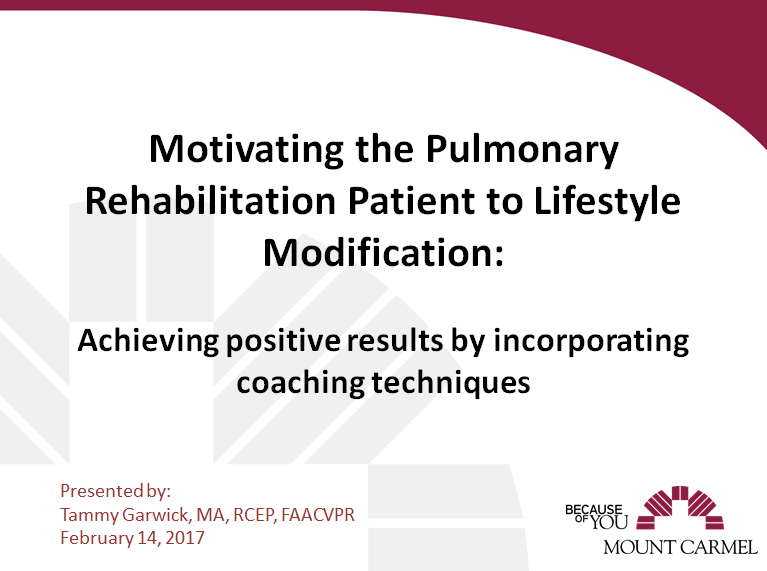Motivating your Patients to Change Behavior
Posted on February 21, 2017 |

This article is based upon the Pulmonary Empowerment Program webinar, “Motivating the Pulmonary Rehabilitation Patient to Lifestyle Modification: Achieving positive results by incorporating coaching techniques” given by Tammy Garwick, MA, RCEP, FAACVPR.
Health coaching is a patient-centered process that involves supporting patients toward their goals and achieving behavior change that match the individual’s values and needs. Rather than employing the paternalistic approach, in which practitioners dictate desired outcomes and the strategies involved in achieving them, in coaching, providers guide individuals toward their goals. This is “giving healthcare back to the patient.” Coaching supports the population health management approach toward which we as a healthcare community now strive; we are managing patients earlier in the disease process and being more proactive in our care. Rather than look at this set of tools as an additional step in our process, we should embrace this – coaching can only heighten our care delivery.
SMART goal setting is the foundation on which coaching approaches are built. Healthcare providers can establish three to five SMART goals within individual treatment plans:
- That can be worked on weekly or bi-weekly;
- Progress against which will be regularly reviewed by the provider/care team;
- While understanding that setbacks are a natural part of the process.
SMART goals are:
S – Specific (“I’m going to use the treadmill more” is not specific; “I will use the treadmill three days a week for 45 minutes each time” is better)
M – Measurable (Can the goal be quantified so you can measure success?)
A – Attainable (Is the goal achievable by your patient? Realistic?)
R – Relevant (Is the goal relevant to the patient’s greater overall plan?)
T – Time framed (By the time the program ends? Within two months?)
COACHING APPROACHES
There are many coaching approaches to choose from, including the transtheoretical model (TMM), appreciative inquiry and non-violent communication. In TMM, we gauge where a patient is in their process of achieving behavior change. Are they in precontemplation, or not quite ready to change their current behaviors? Or possibly contemplation, where they are considering a change? Or are they further along and actually taking action toward their goal? Targeted interventions and support can be designed to help the patient at each of these stages. A good example to consider is helping patients along the road to smoking cessation. As coaching providers, we help move them from considering quitting smoking along the continuum toward maintenance, where they work to sustain their new life without cigarettes. The model’s designers acknowledge that behavior change is difficult! Sometimes people will slide back to the earlier stages of the TMM model in what is termed a “relapse”– they will then need to pass through each stage again in order to achieve their ultimate goal.
Appreciative inquiry involves reframing behaviors in an encouraging light, including concentrating on positive conversations, questions and energy. Focusing on the positive aspects of a patient’s behaviors helps to foster more positive behaviors in the future and eliminates the risk of putting the person in a defensive posture. For example, if a patient with diabetes has high blood sugar, the typical response from a healthcare provider might be, “why is your sugar so high?” Appreciative inquiry would suggest we rephrase this to, “Can you tell me what things you did right today?” or “Tell me what worked for you today?” After identifying these positive elements, you can explore potential improvements, but will do so with an optimistic bent. Next, you might ask, “can you tell me what things you can do positively tomorrow to achieve different results?” Timing your comments and questions in this way creates a supportive and compassionate environment.
Non-violent communication (NVC) is another coaching approach that is based in compassionate communication. In healthcare, providers employing NVC would:
- Make observations rather than evaluations: “I saw you completed 30 minutes on the treadmill today!” versus “Did you make the whole way to 45 minutes like we discussed?”
- Express feelings, not thoughts: “I feel hopeful” (feeling) rather than “I think I might be able to do it” (thought)
- Identify needs not strategies (what they are feeling rather than how they are going to get there): “I need to breathe better” rather than “I need to keep up this pace or this won’t work”
- Make requests not demands: “May I ask you a question about your exercise this morning?” (is asking permission to participate in their healthcare) versus “I want you to tell me how long you walked today.”
Additional Coaching Key Concepts
- Don’t instruct.
- Silence is OK! Listening to your patients is crucial.
- Acknowledge your limitations; you may need to refer to other professionals.
Does health coaching seem like a viable part of your COPD care delivery? Share your thoughts below.
This page was reviewed on February 13, 2020 by the COPD Foundation Content Review and Evaluation Committee